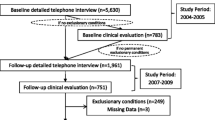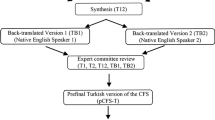Abstract
Estimates of fatigue severity vary according to whether participants are recruited from hospital-based tertiary care clinics, primary medical care, or community-based samples. Sampling methodology is a central issue in epidemiological research because differences in utilization and differential access to health care among participants of varying sociodemographic backgrounds have biased earlier prevalence and severity estimates of fatigue. Most existing studies do not employ randomly selected representative samples and do not examine ethnic and other sociodemographic differences. Findings presented herein derive from a community-based study of fatigue severity and prevalence in an ethnically and socioeconomically diverse sample of 28,673 households in Chicago. The study examined sociodemographic differences in fatigue across African American, White, Latino, and Asian American samples according to age, gender, socioeconomic status, marital status, and parental status. Latinos who were female, Latinos who were older, and Latinos of higher socioeconomic status reported the highest relative severity of fatigue. The implications of these findings are discussed.
Similar content being viewed by others
REFERENCES
Alisky, J. M., Iczkowski, K. A., & Foti, A. A. (1991). Chronic fatigue syndrome [Letter to the editor]. American Family Physician, 44, 56, 61.
Barofsky, I., & West Legro, M. (1991). Definition and measurement of fatigue. Reviews of Infectious Diseases, 13, S94–S97.
Basic Behavioral Science Task Force of the National Advisory Mental Health Council (1998). Basic behavioral science research for mental health. In P. Balls-Organista, K. M. Chun, & G. Marin (Eds.), Readings in ethnic psychology (pp. 73–99). London: Routledge.
Berry, J. W., Dasen, P. R., & Saraswathi, T. S. (1996). Handbook of cross-cultural psychology. Boston, MA: Allyn & Bacon.
Buchwald, D., Manson, S. M., Pearlman, T., Umali, J., & Kith, P. (1996). Race and ethnicity in patients with chronic fatigue. Journal of Chronic Fatigue Syndrome, 2, 53–66.
Buchwald, D., Umali, P., Umali, J., Kith, P., Pearlman, T., & Komaroff, A. L. (1995). Chronic fatigue syndrome prevalence in a Pacific-Northwest healthcare system. Annals of Internal Medicine, 123, 81–88.
Butler, S., Chalder, T., Ron, M., & Wessely, S. (1991). Cognitive behavior therapy in chronic fatigue syndrome. Journal of Neurology, Neurosurgery, and Psychiatry, 54, 153–158.
Cathebras, P. J., Robbins, J. M., Kirmayer, L. J., & Hayton, B. C. (1992). Fatigue in primary care: Prevalence, psychiatric comorbidity, illness behavior, and outcome. Journal of General Internal Medicine, 7, 276–286.
Chalder, T., Berelowitz, G., Pawlikowska, T., Watts, L., Wessely, S., Wright, D., & Wallace, E. P. (1993). Development of a fatigue scale. Journal of Psychosomatic Medicine, 37, 147–153.
Cox, B. D., Blaxter, M., & Buckle, A. (1987). The health and lifestyle survey. London: Health Promotion Research Trust.
Cuellar, I., Arnold, B., & Maldonado, R. (1995). Acculturation rating scale for Mexican-Americans II: A revision of the original ARSMA scale. Hispanic Journal of Behavioral Sciences, 17, 275–304.
Cutler, I. (1982). People and settlement patterns: Recent migration and trends. In Chicago Metropolis of the Mid-Continent (3rd ed., pp. 117–157). Chicago, IL: The Geographic Society of Chicago.
David, A. S., Pelosi, A., McDonald, E., Stephens, D., Ledger, D., Rathbone, R., & Mann, A. (1990). Tired, weak, or in need of rest: Fatigue among general practice attendees. British Medical Journal, 301, 1199–1202.
David, A. S., Wessely, S., & Pelosi, A. J. (1991). Chronic fatigue syndrome: Signs of a new approach. British Journal of Hospital Medicine, 45, 158–163.
Friedberg, F., & Jason, L. A. (1998). Understanding chronic fatigue syndrome: An empirical guide to assessment and treatment. Washington, DC: American Psychological Association.
Fukuda, K., Strauss, S. E., Hickie, I., Sharpe, M. C., Dobbins, J. G., & Komaroff, A. (1994). The chronic fatigue syndrome: A comprehensive approach to its definition and study. Annals of Internal Medicine, 121, 953–959.
Garcia-Preto, N. (1996). Latino families. In M. McGoldrick, J. Giordano, & J. Pearce (Eds.), Ethnicity and Family Therapy (pp. 141–224). New York: Guilford.
Gunn, W. J., Connell, D. B., & Randall, B. (1993). Epidemiology of chronic fatigue syndrome: The Centers-for-Disease-Control Study. In B. R. Bock & J. Whelan (Eds.), Chronic fatigue syndrome (pp. 83–101). New York: Wiley.
Hickie, I. B., Hooker, A. W., Hadzi-Pavlovic, D., Bennett, B. K., Wison, A. J., & Lloyd, A. R. (1996). Fatigue in selected primary care settings: Sociodemographic and psychiatric correlates. Medical Journal of Australia, 164, 585–588.
Hollingshead, A. B. (1975). Four factor index of social status. Unpublished manuscript, Yale University, New Haven, Connecticut.
Jason, L. A., Jordan, K. M., Richman, J. A., Rademaker, A. W., Huang, C.-F., McCready, W., Shales, J., King, C. P., Landis, D., Torres, S., Haney-Davis, T., & Frankenberry, E. L. (1999). A community-based study of prolonged fatigue and chronic fatigue. Journal of Health Psychology, 4, 9–26.
Jason, L. A., Richman, J. A., Friedberg, F., Wagner, L., Taylor, R., & Jordan, K. M. (1997). Politics, science, and the emergence of a new disease: The case of chronic fatigue syndrome. American Psychologist, 52, 973–983.
Jason, L. A., Ropacki, M. T., Santoro, N. B., Richman, J. A., Heatherly, W., Taylor, R., Ferrari, J. R., Plioplys, A. V., Plioplys, S., Rademaker, A., & Golding, J. (1997). A screening scale for chronic fatigue syndrome: Reliability and validity. Journal of Chronic Fatigue Syndrome, 3, 39–59.
Kish, L. (1965). Survey sampling. New York: Wiley.
Lawrie, S. M., Manders, D. N., Geddes, J. R., & Pelosi, A. J. (1997). A population-based incidence study of chronic fatigue. Psychological Medicine, 27, 343–353.
Lawrie, S. M., & Pelosi, A. J. (1995). Chronic fatigue syndrome in the community: Prevalence and associations. British Journal of Psychiatry, 166, 793–797.
Lewis, G., & Wessely, S. (1992). The epidemiology of fatigue: More questions than answers. Journal of Epidemiology and Community Health, 46, 92–97.
Lloyd, A. R., Hickie, I., Boughton, C. R., Spencer, O., & Wakefield, D. (1990). Prevalence of chronic fatigue syndrome in an Australian population. Medical Journal of Australia, 153, 522–528.
Matsumoto, D. R. (1996). Cross-cultural psychology. Boston, MA: Allyn & Bacon.
Pawlikowska, T., Chalder, T., Wessely, S., Wright, D., Hirsch, S., & Wallace, P. (1994). A population based study of fatigue and psychological distress. British Medical Journal, 308, 763–766.
Phinney, J. S. (1998). Ethnic identity in adolescents and adults. In P. Balls-Organista, K. M. Chun, & G. Marin (Eds.), Readings in ethnic psychology (pp. 73–99). London: Routledge.
Reyes, M., Gary, Jr., H. E., Dobbins, J. G., et al. (1997). Descriptive epidemiology of chronic fatigue syndrome: CDC surveillance in four cities. Morbidity and Mortality Weekly Report Surveillance Summaries, 46, 1–13.
Richman, J. A., Flaherty, J. A., & Rospenda, K. M. (1994). Risk factors for chronic fatigue syndrome: Flawed assumptions derived from treatment-based studies? American Journal of Public Health, 84, 282–284.
Rogers, R. G., Hummer, R. A., Nam, C. B., & Peters, K. (1996). Demographic, socioeconomic, and behavioral factors affecting ethnic mortality by cause. Social Forces, 74, 1419–1438.
Steele, L., Dobbins, J. G., Fukuda, K., Reyes, M., Randall, B., Koppelman, M., & Reeves, W. C. (1998). The epidemiology of chronic fatigue in San Francisco. American Journal of Medicine, 105, 835–905.
Sue, D. W., & Sue, D. (1990). Counseling the culturally different: Theory and practice. New York: Wiley.
Wasser, T. E. (1991, August). Statistical correction of Hollingshead's four factor index of social status. Paper presented at the meeting of the American Psychological Association, San Francisco, California.
Wessely, S. (1991). Viruses and fatigue: The current status of the chronic fatigue syndrome. In E. Kurstak (Ed.), Biological factors in psychiatry (pp. 231–256). New York: Plenum Press.
Wessely, S., Chalder, T., Hirsch, S., Wallace, P., & Wright, D. (1997). The prevalence and morbidity of chronic fatigue and chronic fatigue syndrome: A prospective primary care study. American Journal of Public Health, 87, 1449–1455.
Wessely, S., Hotopf, M., & Sharpe, M. (1998). The nature and extent of fatigue. In Chronic Fatigue and its Syndromes (pp. 1–92). New York: Oxford University Press.
Wessely, S., & Powell, R. (1989). Fatigue syndromes: A comparison of chronic 'postiviral' fatigue with neuromuscular and affective disorders. Journal of Neurology, Neurosurgery and Psychiatry, 52, 940–948.
Williams, D. R., & Rucker, T. (1996). Socioeconomic status and the health of racial minority populations. In P. M. Kato & T. Mann (Eds.), Handbook of diversity issues in health psychology (pp. 407–423). New York: Plenum Press.
Author information
Authors and Affiliations
Rights and permissions
About this article
Cite this article
Song, S., Jason, L.A. & Taylor, R.R. The Relationship Between Ethnicity and Fatigue in a Community-Based Sample. Journal of Gender, Culture, and Health 4, 255–268 (1999). https://doi.org/10.1023/A:1023263303987
Issue Date:
DOI: https://doi.org/10.1023/A:1023263303987




